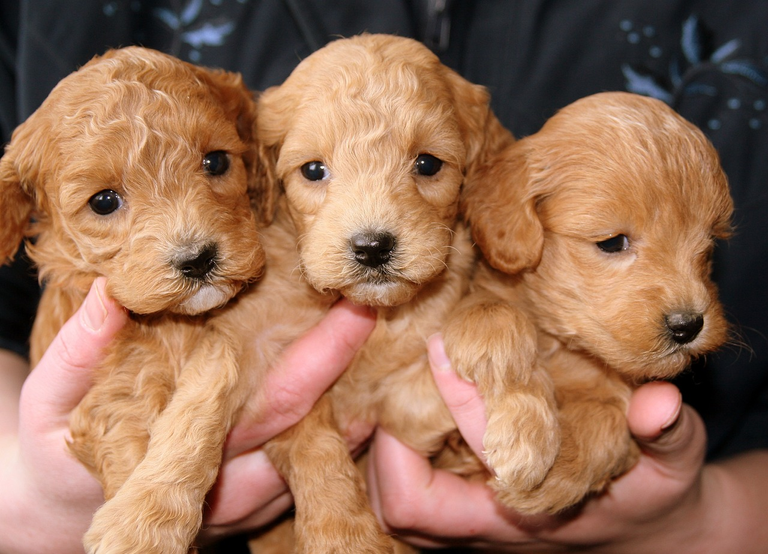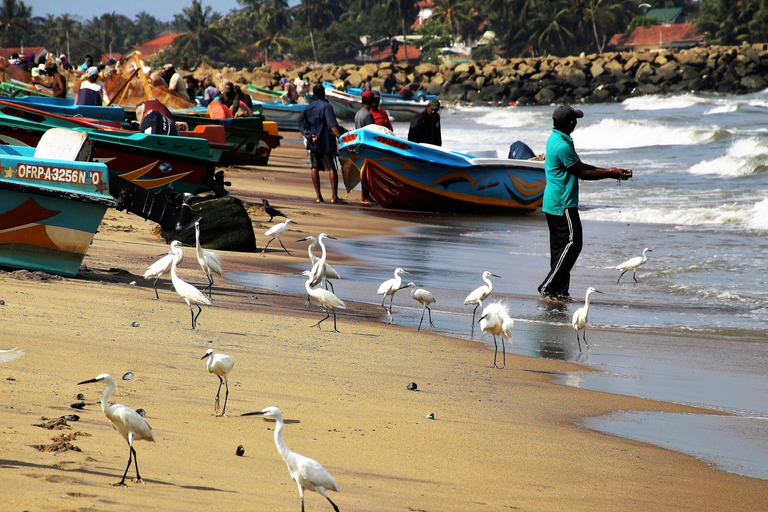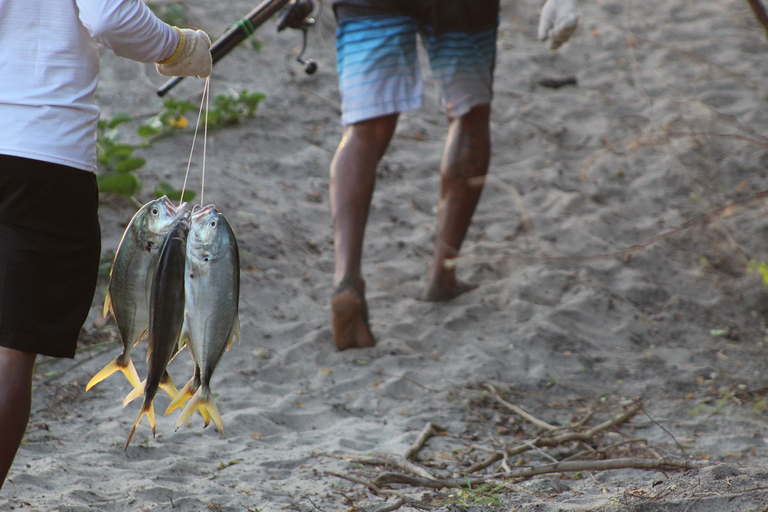
The puppies

Maori had not seen Canela, a stray dog that accompanied her to and from the dock daily. Maori shared with Canela the fish that were given to her, not only because she was her inseparable companion, but also because Canela was pregnant.
"You have to feed, Cinnamon. For you and your cubs". -Maori said to the dog as if she could understand her.
As Maori walked back, she whistled and looked from side to side to see if she could see the animal. Sometimes Cinnamon stayed in the shadows because her belly would not let her walk. Other times, she would amuse herself with bones or other dogs, but at the slightest whistle from Maori, the animal would seek her out and come to the side. However, Maori whistled and whistled, and the animal did not appear.
Cinnamon, Cinnamon," Maori shouted hoarsely, but nothing. From afar, Demian, an old fisherman who spent his money on schnapps, looked at her with a wicked, mocking laugh:
You're crazy, Maori, shouted Demian through his carious teeth, and the woman walked quickly with her cargo. Maori was afraid of bad people and although in the village, many people helped her, there were also many people who made fun of her.

Immediately, the smell of roasting fish permeated the air and starving cats, dogs, and even flies were attracted to the odor.
Maori took off his shoes and felt the warm earth. He poured the guts out of the animals and then entered the small house. The steamer warmed his face, his neck, his body, but Maori only ran a hand across his forehead to shoo away the sweat that was beginning to rise at the roots of his hair. The house was full of things that Maori found every day in the village and grabbed them as if they were treasure: bottle caps, cartons, bags, stones.
Many believed that Maori lived in another world, that he had lost consciousness of what was real or imaginary.
Where is Cinnamon? -Maori asked herself, not waiting for answers, just to talk and listen to herself.

Don't sell me a dog! Not one. Where is Cinnamon? -Maori shouted to the old man. The old man, evidently surprised by the woman's reaction, hesitated, but then reacted with derision:
Ah, but the crazy woman speaks!!! Chu, chu, get out of here you smell like rotten fish, mocked the old fisherman, but Maori lowered the basket from his head and stood in front of the man:
_Where is Cinnamon? -He was surprised by the strength of his own voice, perhaps because it had been a long time since he had spoken to anyone.
What would I know about that street dog, woman. Get out of here, you're ruining my business! -she shouted and made a contemptuous gesture with her hands.
But Maori did not listen to him and angrily snatched the puppies from his hands and when the man tried to take them away, Maori produced a guttural cry, similar to a bark, and bared her teeth at the old man, ready to bite him, as if she herself were Cinnamon, as if she herself were the mother of those puppies. The old man was afraid, because sometimes the unexpected produces fear, and he staggered, then not knowing what to do and accepting defeat, he looked at her and moved away with the other man, and then they both left together.
For her part, Maori took the puppies and wrapped them in her skirt, then put the basket of fish on her head and began her walk toward the house:
Don't worry, Cinnamon, I take care of your cubs as I could never take care of my own, said Maori from deep in her dry belly, as dry as the landscape of that peninsula.

This text is my own, translated with Deepl. Images are free from Pixabay.


UNTIL A FUTURE STORY, FRIENDS
Click here to read in spanish
Los cachorros
En el trayecto de vuelta, con un paisaje árido y un sol inclemente, Maorí venía con su canasta llena de pescados montada sobre la cabeza. A esa hora los pescadores terminaban de vender su mercancía y Maorí esperaba pacientemente que cada uno le diera las sobras, los peces que nadie se llevaba. Así como ella, también estaban los gatos y los perros hambrientos, callejeros, esperando que los hombres de mar esparcieran los restos marinos sobre aquella tierra caliente y desértica.
Maorí no había visto a Canela, una perra callejera que la acompañaba de ida y vuelta, diariamente, al muelle. Maorí compartía con Canela los peces que le regalaban, no solo porque era su compañera inseparable, también porque Canela estaba preñada.
_Tienes que alimentarte, Canela. Por ti y por tus cachorros. –le decía Maorí a la perra como si ésta pudiera entenderla.
Mientras Maorí caminaba de vuelta, silbaba y miraba de un lado a otro para ver si visualizaba al animal. A veces Canela se quedaba bajo las sombras porque ya la panza no la dejaba caminar. Otras veces, se entretenía con huesos o con otros perros, pero al mínimo silbido de Maorí, el animal la buscaba y se ponía al lado. Sin embargo, Maorí silbó y silbó, y el animal no apareció.
_Canela, Canela –gritaba Maorí hasta quedar ronca, pero nada. Desde lejos, Demián, un viejo pescador que gastaba su dinero en aguardiente, la miraba con una risa malvada, burlona:
_Eres loca, Maorí –gritó Demián con sus dientes cariados y la mujer caminó deprisa con su cargamento. Maorí le temía a la gente mala y aunque en el pueblo, mucha gente la ayudaba, también había mucha gente que se burlaba de ella.
Al llegar a casa, se dirigió al patio trasero. Allí Maorí puso los pescados cerca del fogón. Con manos diestras, sacó las vísceras, lavó en agua salada que había en un recipiente y luego puso los pescados sobre la lámina de hierro que había en el fuego. Inmediatamente, el olor de pescado asado empapó el aire y los gatos famélicos, los perros, y hasta las moscas fueron atraídos por el olor.
Maorí se descalzó y sintió la tierra caliente. Les echó las vísceras a los animales y luego entró a la pequeña casa. El vaporón le calentó el rostro, el cuello, el cuerpo, pero Maorí solo pasó una mano por la frente para espantar el sudor que comenzaba a nacer en la raíz de sus cabellos. La casa estaba llena de cosas que Maorí cada día encontraba en el pueblo y las agarraba como si fueran un tesoro: chapas de botellas, cartones, bolsas, piedras. Muchos creían que Maorí vivía en otro mundo, que había perdido la consciencia de lo que era real o imaginario.
_¿Dónde estará Canela? –se preguntó Maorí a sí misma, sin esperar respuestas, solo para hablar y escucharse ella misma.
Una semana después de aquello, Maorí venía del muelle con los restos marinos que le habían regalado cuando vio que Demián, el viejo pescador, tenía unos cachorros en las manos. No tuvo necesidad de acercarse, para saber que aquellos cachorros eran de Canela. Como una fiera, Maorí caminó hacia el anciano que en ese momento entregaba uno de los cachorros a un hombre:
_¡No me vendas ni un perro! Ni uno. ¿Dónde está canela? –le gritó Maorí al anciano. El anciano, evidentemente sorprendido por la reacción de la mujer, titubeó, pero luego reaccionó con burla:
_¡¡Ah, pero la loca habla!! Chu, chu, vete de aquí que hueles a pescado podrido –se burló el viejo pescador, pero Maurí bajó la cesta de su cabeza y se paró frente al hombre:
_¿Dónde está Canela? –volvió a repetir Maorí que se sorprendió de la fuerza de su propia voz, tal vez porque hacía mucho tiempo que no hablaba con nadie.
_¡Qué voy a saber yo de esa perra callejera, mujer. Vete de aquí que me arruinas el negocio! –gritó e hizo un gesto despreciativo con las manos.
Pero Maorí no lo escuchó y le arrebató furiosa los cachorros de las manos y cuando el hombre intentó quitárselos, Maurí produjo un grito gutural, parecido a un ladrido, y le enseñó los dientes al anciano, dispuesta a morderlo, como si ella misma fuera Canela, como si ella misma fuera la mamá de aquellos cachorros. El anciano tuvo miedo, porque a veces lo inesperado produce miedo, y se tambaleó, luego sin saber qué hacer y aceptando la derrota, la miró y se apartó con el otro hombre, para luego marcharse los dos juntos.
Por su parte, Maorí tomó los cachorros y los envolvió con su falda, luego se puso la cesta de pescado sobre la cabeza y comenzó su recorrido hacia la casa:
_No te preocupes, Canela, yo cuido de tus cachorros como nunca pude cuidar de los míos, dijo Maorí desde lo más profundo de su vientre seco, tan seco como el paisaje de aquella península.
No pueden ser más bonitos.
Gracias
Maori experiences motherhood vicariously through the pregnancy of the dog that always accompanies her? It is a powerful idea! The reader is left with this feeling, without the certainty of how the story ends. We want to know where Canela is.
Yes, I think it could be a story that could be capitalized on. Evidently, Canela has been disappeared by Demián. Greetings and thank you very much for the support.
Your story is very interesting, you show us the deep connection between Canela and the woman, then how her reality is transferred to Canela's and she adopts the puppies as her own children.
Thanks for sharing.
Good day.